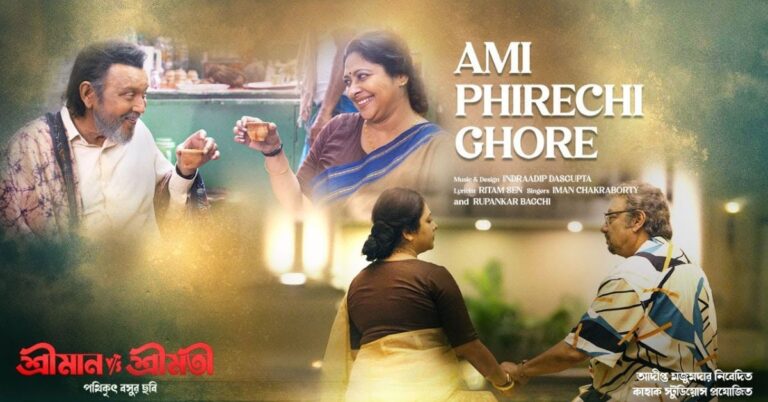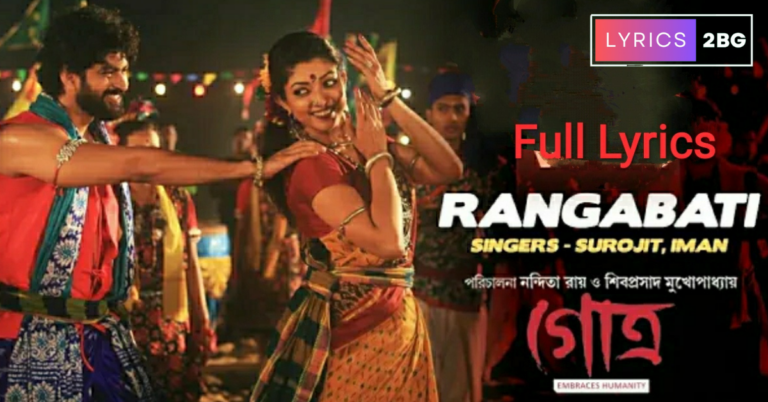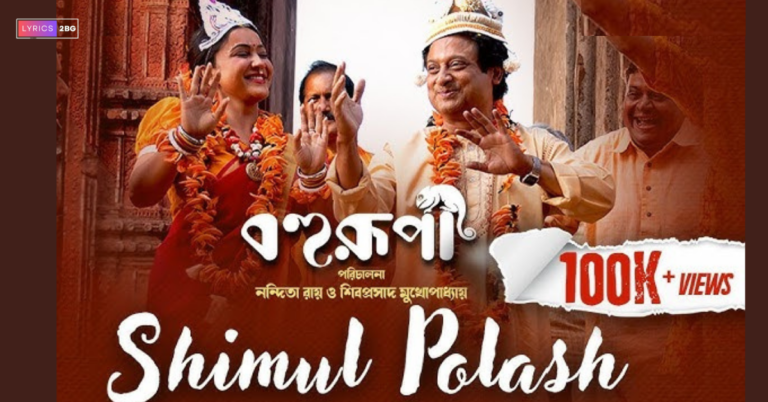Aaj Phagune Agun Lage Lyrics | আজ ফাগুনে আগুন লাগে | Sreetama Baidya | Holi Special
Aaj Phagune Agun Lage Lyrics
আজ ফাগুনে আগুন লাগে পলাশে শিমুলে
অজয় শিলায় কংসাবতী দামোদরের কূলে,
দ্রিম-দি-দিদিম, দ্রিম-দি-দিদিম ধামসা মাদল বোলে
দ্রিম-দি-দিদিম, দ্রিম-দি-দিদিম ধামসা মাদল বোলে,
দেখবিরে চল নাচছে সবাই ঝুমুর গানের তালে।
একো দিনা উড়ি চলি যাব দয়া হায়রে, হায়
সুন্দর কায়া মাটিতে মিল যাব দয়া হায়রে, হায়।
আজ উজল-পাজল মনের কথা মহুলে-পিয়ালে
ডুঙরি পাহাড়, বাঘমুন্ডি অযোধ্যার কূলে,
উজল-পাজল মনের কথা মহুলে-পিয়ালে
ডুঙরি পাহাড়, বাঘমুন্ডি অযোধ্যার কূলে,
ত্রিম-দি-দিদিম, ত্রিম-দি-দিদিম ধামসা মাদল বোলে
ত্রিম-দি-দিদিম, ত্রিম-দি-দিদিম ধামসা মাদল বোলে,
দেখবি রে চল নাচছে সবাই ঝুমুর গানের তালে।
ভুলি যাবো দুনিয়াকর মায়াকে
ছোড় যাবো সুন্দর আপন কায়াকে।
হারি-আরা দুনিয়া ছোড় যাবো দয়া হায়রে, হায়
সুন্দর কায়া মাটিতে মিল যাব দয়া হায়রে, হায়।
একো দিনা উড়ি চলি যাব দয়া হায়রে, হায়
সুন্দর কায়া মাটিতে মিল যাব দয়া হায়রে, হায়।
আজ উড়ছে ভ্রমর গুনগুনগুন
খোঁপায় গোঁজা ফুলে,
আজ মন বাগিচা রঙ্গীন হলো
নানান বনোফুলে।
দ্রিম-দি-দিদিম, দ্রিম-দি-দিদিম ধামসা মাদল বোলে
দ্রিম-দি-দিদিম, দ্রিম-দি-দিদিম ধামসা মাদল বোলে,
দেখবিরে চল নাচছে সবাই ঝুমুর গানের তালে।
নিলি বসনা রুপা মতিয়া
নি যাবো বিনা দিয়া পাতিয়া,
মোইনি যাবো বিনা দিয়া বেড়া দয়া হায়রে, হায়
সুন্দর কায়া মাটিতে মিল যাব দয়া হায়রে, হায়।
একো দিনা উড়ি চলি যাব দয়া হায়রে, হায়
সুন্দর কায়া মাটিতে মিল যাব দয়া হায়রে, হায়।
Meaning of Aaj Phagune Agun Lage Lyrics
Aaj phagune agun lage lyrics filled with vibrant imagery and poignant emotions, captures the essence of traditional Bengali folk music, celebrating the arrival of the spring season with its colorful festivities and joys. The lyrics paint a vivid picture of the beauty and liveliness that accompany the onset of spring in rural Bengal.
Aaj phagune agun lage lyrics begins with a description of the festivities of Phagun, the eleventh month of the Bengali calendar, where fire is lit under the palash and shimul trees, symbolizing the warmth and vibrancy of the season. The mention of Ajay Shilay, Kansabati, and Damodar invokes the pastoral landscapes and riverside gatherings where people come together to celebrate and dance to the rhythm of drums and joyous songs.
The refrain “drim-di-didim” adds a rhythmic quality to the song, echoing the sounds of traditional musical instruments and the excitement of the dancers. It emphasizes the communal spirit and unity as everyone joins in the revelry, swaying to the beats of the jhumur songs.
The second stanza continues the celebration of spring, describing the beauty of nature with references to blooming flowers, rolling hills, and the flowing rivers of Ayodhya. Again, the refrain highlights the exuberance and merriment that pervade the atmosphere, urging everyone to join in the dance and revel in the joyous occasion.
As the song progresses, it takes a more introspective turn, expressing a longing to leave behind the illusions and superficialities of the world. The verses convey a desire to transcend materialistic pursuits and embrace the simplicity and purity symbolized by the natural beauty of the earth.

The repeated refrain “ek dinar udi choli yab doya hayre hay” reflects a sense of impermanence and the fleeting nature of life, urging listeners to seize the moment and cherish the beauty around them. It speaks to the universal human experience of longing for something greater and more meaningful beyond the transient pleasures of the world.
In the final stanzas, the imagery of buzzing bees, fragrant flowers, and colorful gardens further emphasizes the abundance and vitality of springtime. The mention of Neeli Basna and Rupa Motiya adds a romantic element to the song, evoking images of love and longing amidst the blooming flowers.
Ultimately, the song encapsulates the spirit of spring, celebrating the renewal of life and the beauty of nature while also reflecting on deeper philosophical themes of impermanence and the search for meaning. Through its evocative lyrics and rhythmic melodies, it transports listeners to the idyllic landscapes of rural Bengal, where the joyous sounds of music and dance herald the arrival of a new season filled with hope and possibility.
About the author of the Song

Aaj phagune agun lage lyrics is a bengali song sung by Dola Roy and Abhijit Basu. Aaj phagune agun lage was a bengali jhumur song music design by Abhijit Basu. Aaj phagune agun lage lyrics was written by Abhijit Basu. Directed by milton and arranged by Subrata Bose. Aaj phagune agun lage is a basanta utsav special bengali folk song dance cover by Sreetama Baidya, Bidipta Sharma, Sampita Pramanik, Jhilik Dutta Singha Roy And Many Various Artists In Their Own Way.
Song : Aaj Phagune Agun Lage
Singer : Dola Roy And Abhijit Basu
Music Arrangement : Subrata Bose
Lyricist : Abhijit Basu
Music Design : Abhijit Basu
DOP : Biswarup
Label : Milton Music







